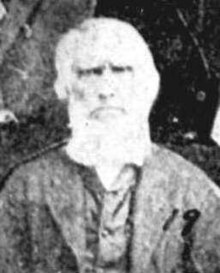Eben Hayes | |
|---|---|
 | |
| South Carolina House of Representatives | |
| In office 1868–1870 | |
| In office 1872–1874 | |
| Personal details | |
| Born | Ebenezer Hayes 1798 Marion,South Carolina |
| Died | 1881 (aged 82–83) |
| Political party | Republican |
| Spouse | Nancy Ann Dew |
Ebenezer (Eben) Hayes (1798 - 1881) was a farmer,Methodist preacher and a member of the South Carolina House of Representatives,during the Reconstruction era. [1]
Ebenezer Hayes was born in Marion,South Carolina,in 1798,the eldest of three sons to William Hayes,whose family came from Virginia and were of English descent. [2] Hayes married Nancy Ann Dew (1806 - 1870) and his brother,Henry,married Nancy's sister,Marina. Ebenezer and Nancy had nine children,born between 1826 and 1854. [3]
Hayes represented Marion County,South Carolina in the South Carolina House of Representatives,during the Reconstruction era. He was elected twice,serving from 1868 to 1870 and 1872 to 1874. [4] [5] He was a member of the Radical Republicans,a party faction with a goal of immediate,complete and permanent eradication of slavery,without compromise. [6]